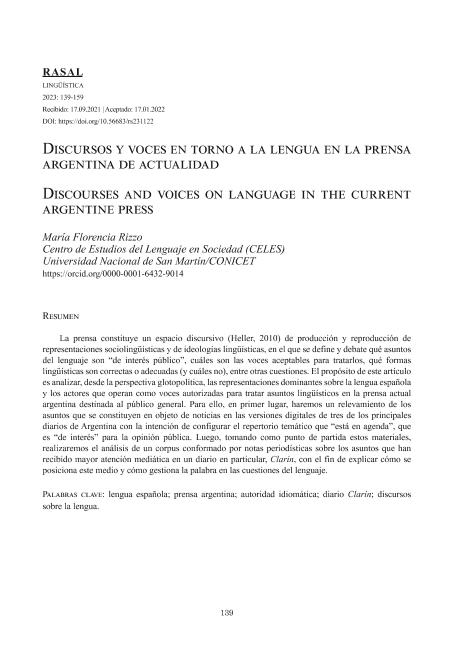Mostrar el registro sencillo del ítem
dc.contributor.author
Rizzo, María Florencia

dc.date.available
2024-03-01T15:22:30Z
dc.date.issued
2023-03
dc.identifier.citation
Rizzo, María Florencia; Discursos y voces en torno a la lengua en la prensa argentina de actualidad; Sociedad Argentina de Estudios Lingüísticos; RASAL Lingüística; 1; 3-2023; 139-159
dc.identifier.issn
2250-7353
dc.identifier.uri
http://hdl.handle.net/11336/229117
dc.description.abstract
La prensa constituye un espacio discursivo (Heller, 2010) de producción y reproducción de representaciones sociolingüísticas y de ideologías lingüísticas, en el que se define y debate qué asuntos del lenguaje son “de interés público”, cuáles son las voces aceptables para tratarlos, qué formas lingüísticas son correctas o adecuadas (y cuáles no), entre otras cuestiones. El propósito de este artículo es analizar, desde la perspectiva glotopolítica, las representaciones dominantes sobre la lengua española y los actores que operan como voces autorizadas para tratar asuntos lingüísticos en la prensa actual argentina destinada al público general. Para ello, en primer lugar, haremos un relevamiento de los asuntos que se constituyen en objeto de noticias en las versiones digitales de tres de los principales diarios de Argentina con la intención de configurar el repertorio temático que “está en agenda”, que es “de interés” para la opinión pública. Luego, tomando como punto de partida estos materiales, realizaremos el análisis de un corpus conformado por notas periodísticas sobre los asuntos que han recibido mayor atención mediática en un diario en particular, Clarín, con el fin de explicar cómo se posiciona este medio y cómo gestiona la palabra en las cuestiones del lenguaje.
dc.description.abstract
The press constitutes a discursive space (Heller, 2010) for the production and reproduction of sociolinguistic representations and linguistic ideologies, in which several issues are defined and debated; among them, which language themes are of “public interest”, which are the “authoritative” voices to approach them, which linguistic forms are correct or adequate (and not). The purpose of this article is to analyze, from the glottopolitical perspective, the dominant representations of the Spanish language and the agents that operate as authorized voices to deal with current language debates in mainstream Argentine newspapers. To this end, I first survey the more prominent language topics covered by the online version of three newspapers of record, in order to map the thematic repertoire that constitutes “the agenda”, and becomes “of interest” to public opinion. Subsequently, based on this corpus of news clippings, I analyze the issues that have received the most attention in Clarín, which has the highest circulation of the three, to explain how this newspaper positions itself and manages the discourse agenda as it relates to language issues.
dc.format
application/pdf
dc.language.iso
spa
dc.publisher
Sociedad Argentina de Estudios Lingüísticos
dc.rights
info:eu-repo/semantics/openAccess
dc.rights.uri
https://creativecommons.org/licenses/by-sa/2.5/ar/
dc.subject
LENGUA ESPAÑOLA
dc.subject
PRENSA ARGENTINA
dc.subject
AUTORIDAD IDIOMÁTICA
dc.subject
DIARIO CLARÍN
dc.subject.classification
Estudios Generales del Lenguaje

dc.subject.classification
Lengua y Literatura

dc.subject.classification
HUMANIDADES

dc.title
Discursos y voces en torno a la lengua en la prensa argentina de actualidad
dc.title
Discourses and voices on language in the current argentine press
dc.type
info:eu-repo/semantics/article
dc.type
info:ar-repo/semantics/artículo
dc.type
info:eu-repo/semantics/publishedVersion
dc.date.updated
2024-02-29T13:19:00Z
dc.identifier.eissn
2618-3455
dc.journal.number
1
dc.journal.pagination
139-159
dc.journal.pais
Argentina

dc.journal.ciudad
Ciudad Autónoma de Buenos Aires
dc.description.fil
Fil: Rizzo, María Florencia. Universidad Nacional de San Martin. Escuela de Humanidades. Centro de Estudios del Lenguaje En Sociedad.; Argentina. Universidad Nacional de San Martín. Escuela de Humanidades. Laboratorio de Investigación en Ciencias Humanas - Consejo Nacional de Investigaciones Científicas y Técnicas. Oficina de Coordinación Administrativa Parque Centenario. Laboratorio de Investigación en Ciencias Humanas; Argentina
dc.journal.title
RASAL Lingüística
dc.relation.alternativeid
info:eu-repo/semantics/altIdentifier/url/https://rasal.sael.org.ar/index.php/inicio/article/view/36
dc.relation.alternativeid
info:eu-repo/semantics/altIdentifier/doi/https://doi.org/10.56683/rs231122
Archivos asociados
